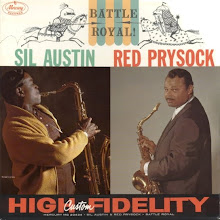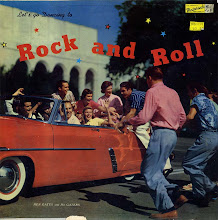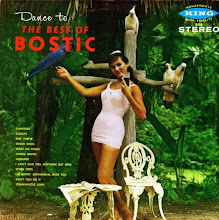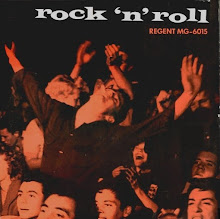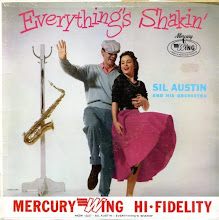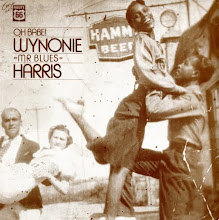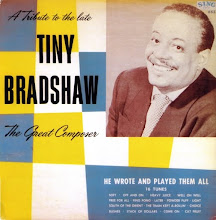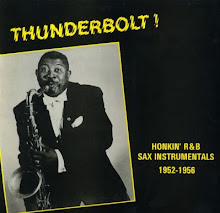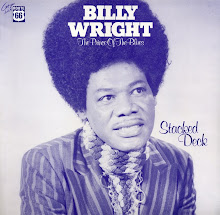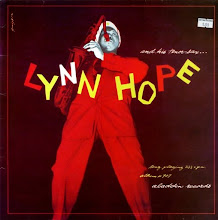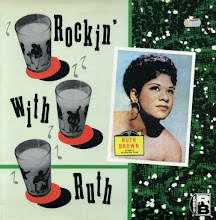Side 1:
01) Picadilly Circus
02) May I
03) Billy In The Lion's Den
04) Sweet And Lovely
05) There Will Never Be Another You
06) Stuffy
Side 2:
01) Just You, Just Me
02) Down To Earth
03) What'll I Do
04) Fine And Dandy
05) Get Hot
06) Solitude
Many thanks to The Magnificent Goldberg for donating this LP. Rips (m4a, variable bit rate, approx 260 - 270 kbps) are from the 1980s vinyl reissue on the European Swingtime label. Cover art is from the web. The King LP "Billy In The Lions Den" was originally issued in March 1957 and was in fact an extended 12" version of a 10" LP issued in 1955 under the title "Jazz Interludes."
There were contrasting fortunes for the two principals on this LP. Both had a heroin habit, but for bebop baritone sax man Leo Parker it was a career stopper while guitarist Bill Jennings kept on recording through the 1950s and on into the 1960s. Parker followed up this July 1954 session with one more alongside his old cohort Illinois Jacquet for Clef in December '54 and that was the end of his recording career until 1961 when he had a tragically brief comeback for Blue Note which was cut short by a fatal heart attack.
There is a more detailed rundown of Leo Parker's career on this post which includes lotsa links into more of his work featured on this blog:
There were contrasting fortunes for the two principals on this LP. Both had a heroin habit, but for bebop baritone sax man Leo Parker it was a career stopper while guitarist Bill Jennings kept on recording through the 1950s and on into the 1960s. Parker followed up this July 1954 session with one more alongside his old cohort Illinois Jacquet for Clef in December '54 and that was the end of his recording career until 1961 when he had a tragically brief comeback for Blue Note which was cut short by a fatal heart attack.
There is a more detailed rundown of Leo Parker's career on this post which includes lotsa links into more of his work featured on this blog:
Bill Jennings was a very busy musician indeed during the 1950s. He was with Louis Jordan and His Tympany Five from 1948 until the end of 1951. In the early 50s he also recorded for Gotham with a few singles issued under his own name plus a session as a sideman with Jimmy Preston. In 1951 he joined fellow ex-Tympany Five member organist Wild Bill Davis along with drummer Chris Columbus to form the kind of organ / guitar / drums trio which would become popular in the later '50s and early '60s. The Wild Bill Davis Trio recorded for Columbia / Okeh through to 1953.
In December 1952 Bill Jennings recorded his first session for King as a sideman with Roy Brown. Bill was on another Roy Brown session in June 1953. Just over a year later came the sides on this LP with Leo Parker, followed by Bill Jennings Quartet sides which were released on single, EP and LP by King. "Big Boy" on which Bill was backed by the Bill Doggett combo was a substantial R&B hit in 1955. In December 1955 Bill recorded an album "Mood Indigo" on which his guitar was accompanied only by vibes.
In December 1952 Bill Jennings recorded his first session for King as a sideman with Roy Brown. Bill was on another Roy Brown session in June 1953. Just over a year later came the sides on this LP with Leo Parker, followed by Bill Jennings Quartet sides which were released on single, EP and LP by King. "Big Boy" on which Bill was backed by the Bill Doggett combo was a substantial R&B hit in 1955. In December 1955 Bill recorded an album "Mood Indigo" on which his guitar was accompanied only by vibes.
The Fabulous Guitar of Bill Jennings (King LP 295-106) 10" LP released 1955
Mood Indigo (King LP 395-508) 12" LP released 1956
From the end of 1955 through to 1958 Bill Jennings was occupied with session work for King. Earl (Connelly) King, Nita Lore, Little Willie John (3 sessions, including "Fever"), Etta Jones, Titus Turner (2 sessions) and Bubber Johnson all benefited from Bill's jazzy guitar playing. In 1957/8 Bill played alongside tenor sax man Willis Jackson on Little Willie John and Titus Turner sessions. In September 1957 Willis and Bill recorded a few sides for King accompanied by organ (James Orville Johnson) and drums (Alvin Johnson). The sax / guitar / organ /drums combo was very much the coming sound of soul jazz, a sound which would be popularized not at King, but at Prestige, especially when the Jackson / Jennings pairing was joined by Jack McDuff on organ.
From May 1959 the Jackson / Jennings / McDuff lineup (and variants thereof) began to record a series of LPs which stretched on through the 1960s. The Prestige albums were superior in their presentation when compared to the King LPs. The same could be said of another King sax / organ combo which crossed from King to Prestige, the Lockjaw Davis / Shirley Scott group. Production was superior (often by Rudy Van Gelder), sleeve design and sleeve notes were carefully prepared, and in the wax grooves the musicians were given time to stretch out as track lengths exceeded the normal running time of singles.
Prestige didn't neglect fans of singles or the juke box crowd as cut down versions of LP tracks were issued on 45. Unlike King, Prestige seemed to appreciate the potential of both the LP and the 45 rpm single in jazz, as did Blue Note. It's noticeable that on "Billy In The Lions Den" none of the track running times exceed those of a 45 rpm single, despite the fact that almost all the tracks never saw single release.
Willis, Bill and Jack on Prestige, 1959
More Fax On The Trax, Jack!
All tracks recorded in Cincinatti on 6th, 7th, 8th July 1954. Personnel: Leo Parker (baritone sax); Andrew Johnson (piano, organ); Bill Jennings (guitar); Joe Williams (bass); George De Hart (drums)
Leo Parker not on "Sweet And Lovely," which was the only track on the LP to be released on a single - They Can't Take That Away From Me / Sweet And Lovely - Bill Jennings Quartet - King 4805 - released in June 1955.
This collection first appeared in the form of a 10 inch, 8 track LP in 1955 - "Jazz Interludes."
The 12 inch, 12 track version, "Billy In The Lions Den" was issued in March 1957:
Leo Parker not on "Sweet And Lovely," which was the only track on the LP to be released on a single - They Can't Take That Away From Me / Sweet And Lovely - Bill Jennings Quartet - King 4805 - released in June 1955.
This collection first appeared in the form of a 10 inch, 8 track LP in 1955 - "Jazz Interludes."
The 12 inch, 12 track version, "Billy In The Lions Den" was issued in March 1957:
Billboard 2nd March 1957



























































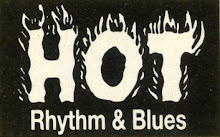
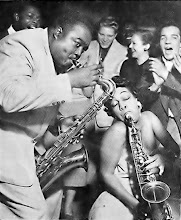





%2045%20-%201012A.png)
.jpg)

















